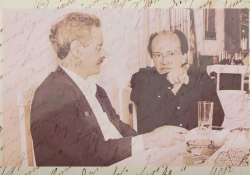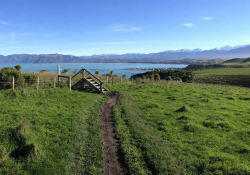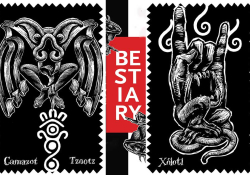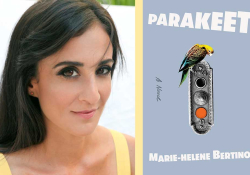The BBC’s Top 100 Foreign Films: An Appreciation of Theo Angelopoulos’s Landscape in the Mist

The BBC has in the past conducted cinematic surveys to determine the top 100 American films ever made, the best comedies ever made, and the best films of the 21st century. This year the BBC chose 209 film critics from 43 countries to choose the 100 best foreign films made in languages other than English, with the final list featuring 100 films from 24 nations in 19 languages. To no surprise, films by familiar directors such as Federico Fellini, Ingmar Bergman, Jean Renoir, François Truffaut, and Jean-Luc Godard made it into the top ten, with Akira Kurosawa at number one with Seven Samurai (1954).
But I was personally pleased to see that the Greek director Theo Angelopoulos (1935–2012) made it onto the list with votes from critics in India, China, Israel, Turkey, Hong Kong, and South Africa. And the film chosen from Angelopoulos’s remarkable list of films was Landscape in the Mist (1988), a touching coming-of-age drama about a young brother and sister on a voyage to find their father, whom they had never met. I knew Angelopoulos personally beginning in the 1970s when I was teaching in Athens, Greece, and began writing about his films, such as the multi-award-winning The Travelling Players (1975), which took on Greek history, politics, and mythology (often with references to Homer’s Odyssey) and was shot in “slow” scenes that could play out for minutes in landscapes that became strongly emotional characters themselves.
Angelopoulos made it clear to me over the years that what he wished to capture in his cinema was “the other Greece” rather than the bright, sunny, tourist-like island images and life, and thus stories that crossed many borders, including between nations, history, and myth, the past and the present, silence and sound, the seen and unseen, what is “Greek” and what is not. Landscape in the Mist focuses on a five-year-old boy, Alexander (Michalis Zeke), and his eleven-year-old sister, Voula (Tania Palaiologu), who set out together on a journey to try and find the man they are told is their father, who—they’ve been told—lives in Germany. Angelopoulos structured most of his films with a sense of the themes and narrative lines of the Odyssey, and here we have the children’s search for a father, similar to Telemachus’s search for his father, Odysseus, who left for Troy when Telemachus was barely a child.
The film, which won numerous awards including the Silver Lion at the 1988 Venice Film Festival, could be subtitled a “documentary fairy tale,” for the focus is on children, and the stark realism of the locations and landscapes documents the reality of their journey. But Voula early on sets up the mythical fairy-tale spirit of the film as we hear her say in a voiceover to her brother:
In the beginning there was darkness and then there was light and the light was divided from the darkness and the earth from the sea, and the rivers, the lakes, and the mountains were made, and then the flowers and the trees, and animals and birds.
Cut to a scene later in the film as Voula and Alexander are befriended by a young Greek actor, Orestes (Stratos Tzortzoglou), who stands between them. Reality and mythology cross paths at this moment as they stand on the waterfront of the northern Greek city of Thessaloniki and see a large ancient marble hand with a broken index finger rising from the sea, as if a magical gesture by the gods or history itself. But as the camera pulls back, we see and hear a helicopter towing the hand somewhere.
The image of the rising hand holds the viewers’ attention as well as that of the three characters, but Angelopoulos offers no speech or “answer” other than the sense that Greece has so much history and mythology that even daily life can be inhabited by the past when viewed from a new perspective.
Even the online trailer for Landscape in the Mist, with its haunting soundtrack composed by Eleni Karaindrou, combines a winter landscape and mist with a lone tree standing in the distance as our two children walk onward, viewed from behind, with no dialogue for two minutes until they finally reach the tree and hug it as if it were a person. And this is the final shot of the film. Have they found their father? No. But they have crossed into Germany, and the hugging of the tree, yes, in the mist, echoes back to Voula’s opening speech setting up the creation of the universe “in the beginning,” in a fairy-tale-like delivery. It is, in fact, because of the engaging power of scenes such as this that I chose to title my book on Angelopoulos’s films, The Films of Theo Angelopoulos: A Cinema of Contemplation (1997). Rather than the high-speed pacing and special effects of so many Hollywood films, Angelopoulos champions “slow cinema,” which offers us, the viewers, the opportunity to be totally engaged in the landscape and the characters and to be left, with this film, contemplating what hugging a lone tree in winter means for our young characters.
Angelopoulos champions “slow cinema,” which offers us, the viewers, the opportunity to be totally engaged in the landscape and the characters and to be left, with this film, contemplating what hugging a lone tree in winter means for our young characters.
Angelopoulos himself commented that Landscape in the Mist is not “just about two children looking for their father. It is a journey which is the initiation into life. On the road they learn everything—love and death, lies and truth, beauty and destruction. The journey is simply a way to focus on what life gives us all.”

one week before he died on the set of his film
The Other Sea after being hit by a motorcycle.
Finally, I would add that part of the power of Angelopoulos’s cinema is that we are often moved by what we cannot see in a scene. Filmmakers around the world have given us so much graphic violence on screen over the years, but Angelopoulos was aware that just as in ancient Greek tragedies, from Sophocles’ Oedipus Rex to Euripides’ Medea, the murders and violence happen offstage, but we come to share the characters’ pain and agony through the dialogue or chorus scenes.
Simply put, in one scene of the film, the children hitch a ride with a nameless truck driver who later tries to leave them by the roadside, but as Alexander falls asleep inside the truck, the driver grabs Voula and throws her into the back of the truck. He climbs in himself, but a sheet covers the back, and we see and hear nothing for several minutes until Alexander calls out for his sister. Voula climbs out of the back, and it’s clear she has been raped. She is bleeding and wipes a handful of her blood on the side of the truck. Numerous commentators reflect what Dan Schneider has written in his review of the film. He says the scene “is amongst the best filmic depictions of sexual abuse ever shown, and should be shown as a primer to Hollywood directors on how to be subtle and poetic, especially when dealing with such terminally PC topics.” Marble hands rising from the sea hold our attention, but so does seeing an eleven-year-old girl walking out of the back of a truck bleeding after a scene we have not seen but can painfully imagine.
Theo, we miss you, and it is a shame you did not get to finish The Other Sea, which deals with the contemporary theme of refugees pouring into Greece from Afghanistan, Syria, and beyond. But I feel the new status that the BBC’s 100 greatest foreign-language films list has established will mean that more people around the world will want to appreciate and enjoy a cinema that can evoke tears as well as smiles.
University of Oklahoma






